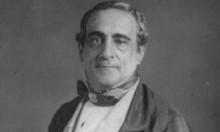 Narciso López (1798-1851), Venezuelan filibuster, considered by some a precursor of Cuba’s independence struggle, but for others and adventurer seeking Cuba’s admission to the United States as a slave state. Perhaps he did want a free Cuba, but one where slavery would be preserved. Whatever his motivations, his actions helped arouse anti-Spanish sentiment and paved the way for later uprisings. Born September 13th, he joined the Spanish army fighting Simón Bolívar, rising rapidly in rank. When the Spanish withdrew to Cuba in 1823, he accompanied them and married the sister of Francisco de Frías Jacott. But the marriage soon broke down and López moved to Spain, where he fought the Carlist rebels and became a general. In 1841 he returned to Cuba and, during the governorship of his friend Gerónimo Valdés y Sierra, he held important posts, including the governorship of Trinidad. He also presided over courts martial, becoming notorious for his harsh sentences for political dissent. With the arrival of Governor Leopoldo O’Donnell y Joris he lost his posts and turned to business ventures, most of which proved unsuccessful.
Narciso López (1798-1851), Venezuelan filibuster, considered by some a precursor of Cuba’s independence struggle, but for others and adventurer seeking Cuba’s admission to the United States as a slave state. Perhaps he did want a free Cuba, but one where slavery would be preserved. Whatever his motivations, his actions helped arouse anti-Spanish sentiment and paved the way for later uprisings. Born September 13th, he joined the Spanish army fighting Simón Bolívar, rising rapidly in rank. When the Spanish withdrew to Cuba in 1823, he accompanied them and married the sister of Francisco de Frías Jacott. But the marriage soon broke down and López moved to Spain, where he fought the Carlist rebels and became a general. In 1841 he returned to Cuba and, during the governorship of his friend Gerónimo Valdés y Sierra, he held important posts, including the governorship of Trinidad. He also presided over courts martial, becoming notorious for his harsh sentences for political dissent. With the arrival of Governor Leopoldo O’Donnell y Joris he lost his posts and turned to business ventures, most of which proved unsuccessful.
By then he had grown unhappy with Spanish rule. In 1848 he began conspiring with Cubans who favored annexation by the United States in the so-called Mina de la Rosa Cubana. This failed, and he fled to the United States, to resume his conspiracies. In 1849 he sailed from New Orleans with a force of 609 men, most of them American veterans of the US-Mexican War, flying what became Cuba’s national flag. The expeditionaries landed in Cárdenas, overwhelmed its small force of defenders and took the town. But finding little local support, and with Spanish reinforcements approaching, López returned to the United States. The daring and untiring Venezuelan returned in 1851, with some 400 “broken-down men and lads,” mostly Americans from the southern states, some Hungarians and Germans and a few Cubans. He planned to join up with conspirators within the island, but these rose prematurely and were soon wiped out. His own landing in Pinar del Río was in a desolate area, far from his allies. The fears of the government and hopes of sympathizers exaggerated the size of his little force and, although he was soon defeated and captured, the actual Spanish losses in achieving this were, in the circumstances, surprisingly high. As he was publicly executed by garotte in Havana on September 1st, he insisted “My death will not change the destiny of Cuba.”
Jaime Suchlicki is Director of the Cuban Studies Institute, CSI, a non-profit research group in Coral Gables, FL. He is the author of Cuba: From Columbus to Castro & Beyond, now in its 5th edition; Mexico: From Montezuma to the Rise of the PAN, 2nd edition, and of the recently published Breve Historia de Cuba.








